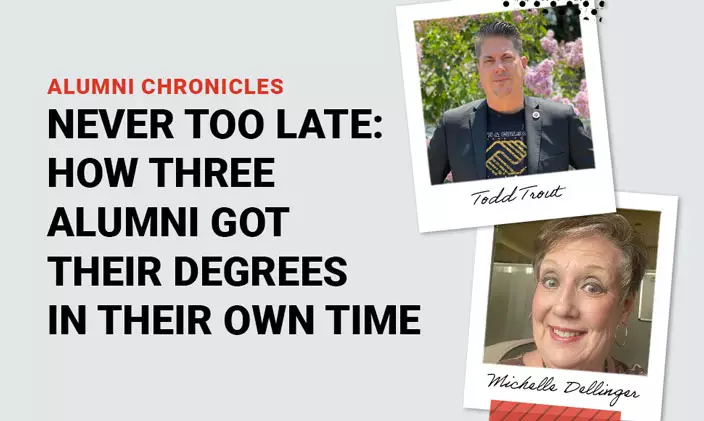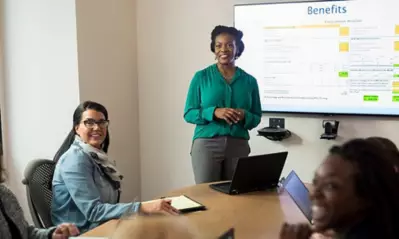Discover more stories in our Alumni Chronicles Magazine!
Never too late: How three alumni got their degrees in their own time
By Laurie Davies
What do a 51-year-old Boys & Girls Club CEO, a 63-year-old nurse and a 73-year-old Health Administration graduate have in common?
Each started late in life and studied late into evenings. They all took laptops on vacations, they fought through not having the energy they once did, and one even battled a paralyzing fear of failure. But they all pushed through. Here are the inspiring stories of three recent University graduates who prove it’s never too late to chase your dreams.
Ã˝
Todd Trout‚Äôs ∆þ…´ ”∆µ diploma hangs in a place of honor behind his desk, right next to his 1990s Tom Petty poster from the Fillmore. Not only does the diploma remind him that he can press through hard things ‚Äî he earned his degree at age 50 ‚Äî but he hopes it also inspires the kids he serves as CEO of the Boys & Girls Club of Buena Park.
Despite living near two major amusement parks in Southern California, some of the kids Trout serves have anything but carefree lives. “We ask our kids, ‘Where are you going to be in five years?’ Sometimes it’s heartbreaking and tragic. Some of them say, ‘I don’t know, I might be dead.’ There’s no hope,” he says.
He’s trying to change that, describing the Boys & Girls Club as a wrecking ball in the community for good.
Trout started at the Boys & Girls Club 26 years ago as a team director and advanced to a program director. Eight years ago, he was named CEO. “Part of the contingency of my hiring was to finish my degree,” he says.
On one hand, he had already cut his teeth decades earlier, running a gym for inner-city LA youth and gangs. He knows youth development because it’s his heartbeat and how he has spent his entire career. On the other hand, he has always pointed kids — his own and his Club kids — toward education.
“Here I was encouraging all the kids in my life to go to college and I was college-less,” he says.
Five years ago, he decided to fix that. Through his workplace, he applied for a ∆þ…´ ”∆µ scholarship. To his surprise, he was one of 10 who were awarded scholarships through that nationwide opportunity.
The scholarship brought welcome financial news but also intense fear of failure. “I was terrified. I thought, ‘I cannot mess this up. If I get F’s I’m going to lose this scholarship,’” he says. The fear, rooted in not doing well in junior college as an 18-year-old, was something Trout had to overcome. “I already felt like a failure to some extent, never having gone to school.”
Running a $2.3 million budget, serving 650 kids a day in an Orange County community that ranks high in gang arrests, leading a large staff, playing in a band, keeping up with Thursday date nights with his wife, and devoting nights and weekends to homework, Trout got it done.
“I would do a little bit of work here and a little bit of work there. I did homework on my lunches. I dove into my blind spots. And my academic counselor kept me grounded. He helped me find the confidence that I could do this.”
In some ways, being a college student in midlife motivated him. “Being older, it meant way more to me,” he says, acknowledging that he picked up many new tools that he applies on the job. “It has made me better at my approach to problem-solving, which is one of my big jobs as CEO.”
An educator and pastor’s wife who accompanied her husband on hospital visits for years, Michelle Dellinger would look at the IVs and monitors and think, “How does this all work? What is their diagnosis? How are they being cared for?”
As she got older, dreams of entering nursing felt foolish. After all, she had graduated in 1980 with a degree in education, and she’d spent years teaching junior high and high school students English, speech, choir and drama.
“Nursing is left brain, so I cried a lot in nursing school,” she says, half joking and half not.
But you read that right. After 22 years in education, Dellinger enrolled in nursing school at age 48. Today, she has worked as a nurse for 16 years. But even with her RN, she says there were certain leadership opportunities closed to her because she didn‚Äôt have her Bachelor of Science in Nursing. That changed when, at age 63, she earned her RN to BSN degree onlineÃ˝from ∆þ…´ ”∆µ.
“This degree was so much work. The clinicals were blood, sweat and tears for me. I cried over pharmacy questions, the biology of it, the science of it all,” Dellinger recalls.
Today, she works as a head and neck surgery nurse at the downtown Franklin, Colorado, campus for Kaiser Permanente. She sees postsurgical patients who have had tonsillectomies, carcinoma treatment and other surgical procedures.Ã˝
Looking back, she’s glad she earned her degree, but she’s also glad it’s behind her so she can get some sleep.
“The realities of being a student later in life are you get tired. You have to prioritize your rest. There were times I missed the grandkids’ activities in order to study. One time, we went to Mexico and while my husband was at the pool, I was doing homework on my laptop. I had to take school with me,” she says. “But I have never regretted getting my degree. It doesn’t matter how old you are. God leads you through so much to get to your desire sometimes. He may give it to you kind of late, but I don’t regret it.”
Now 64, Dellinger says her BSN opens up more possibilities within nursing. And her personal satisfaction with her accomplishment is high. “Teaching was my love, but nursing is my passion,” she says. “I didn’t care what anyone else thought (about the career switch), I was doing this for me. This degree means more to me than anyone will ever know.”
Covette Greenwood
Bachelor of Science in Health Administration, 2021
Ã˝
A grandmother to 48, a great-grandmother to 68, and a great-great grandmother to four little ones, Covette Greenwood has a lot of young eyes looking at her. So, she wanted to give them something to see.
A diploma, for example.
Now 74 years old, Greenwood earned a bachelor‚Äôs in Health Administration in 2021 and credits ∆þ…´ ”∆µ with opening up a positive path for her life. Tragically losing two of her five children between 2008 and 2010, she needed a path forward ‚Äî something to hope for again.
“I was trying to figure out a way to deal with their deaths, and school was good for me,” she says. “It was something that kept my mind occupied instead of thinking about them all day every day.”
Greenwood was 71 when she earned her associate degree, and 73 when she earned her bachelor’s. While she’s not using those degrees in a professional setting (“not yet anyway — give it time,” she quips), the Montebello, California, resident says getting the degrees was a personal goal.
In fact, she says, enrolling in college so late in life felt carefree. “I was excited to wake up in the morning and get in school. I could work on my coursework as long as I wanted to — I didn’t have the pressure of time,” she says. Math was a hurdle, but thank goodness for her great-grandson, Paul, who helped his “granny” get through algebra.
“I had always wanted to go to college, but I started having children young, so that was put off. I finally jumped on it,” Greenwood says. “I often look at my diplomas and think, ‘I’m not giving up on anything in life. Not one thing.’”
The proud matriarch of her family, she spends most of her days wearing her “granny” hat, helping with child care and loving on the young people in her life. “They always ask me how I did it,” she says.
The short answer is work and prayer.
The longer answer is this: “I just tell them it wasn’t easy,” she says. “You have to put your mind on a goal and continue pushing. Nothing comes easy in this life. You have to work toward it.”
Read more alumni stories on the blog!






